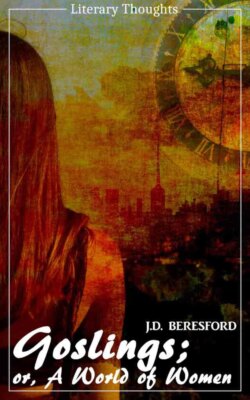Читать книгу Goslings (John Davys ("J.D.") Beresford) (Literary Thoughts Edition) - J. D. Beresford - Страница 22
На сайте Литреса книга снята с продажи.
VI—DISASTER
Оглавление1
Russia was smitten. Once more communication was cut off from Moscow, this time by a different agent. The work of the city was paralysed. Men were falling dead in the street, and there were only women to bury them. A wholesale emigration had begun. The roads were choked with people on foot and in carriages, for the trains had ceased to run.
The news filtered in by degrees: it was confirmed, contradicted and definitely confirmed again every few hours.
Then came final confirmation, with the news that something approaching war had broken out—a war of defence. Germany had sent troops to the frontier to stem the tide of emigrants from smitten Russia and Poland; and Austria-Hungary was following her example.
Parliament re-assembled before the Easter recess had expired. The time for more drastic measures had come, and the Premier explained to the House that it was proposed to bring in a Bill immediately to cut off communication with Europe.
There can be no doubt that England was now badly scared, but centuries of protection had established a belief in security which was not easily shaken.
The enthusiasts for the “closed door” policy found plenty of recruits, but on the other side there was a solid body of opinion which maintained that the danger was grossly exaggerated. And when the Evening Chronicle came out with a long leader and a backing of expert opinion, to prove that the “Closed Door” Bill—as it was commonly called—was a dodge of the Government’s in order to retain office, a well-marked reaction followed against the last and terrible step of cutting off all communication with Europe; and the Conservative party was joined by some avowed Liberals who had personal interests to consider in this connexion.
In committee-rooms, members of the Opposition were inclined to be jubilant: “If we can throw out the Government on this Bill we shall simply sweep the country ... all the manufacturers in the North will be with us ... even Scotland, most likely ... we should come back with a record majority....”
The prospects were so magnificent that there could be no hesitation in making a party question of the Bill.
No time was to be lost, for the Bill was to be rushed, it was an emergency measure, and it was proposed that it should become law within four days. Preparations were already in hand to carry out the provisions enacted.
An urgent rally of the Opposition was made, and when the Bill came up for the second reading the Premier addressed a well-filled House. The House was not crowded because a large number of people, including many members of Parliament, were on their way to America. All the big liners were packed on their outward voyage and were returning, contrary to all precedent, in ballast—this ballast was exclusively food-stuffs.
The Premier introduced the Bill in a speech which was remarkable for its sincerity and earnestness. He outlined the arrangements that were being made to feed the community, and showed clearly that while communication remained open with America, there was no fear of any serious shortage. Pausing for a moment on this question of intercourse with America, he made a point of the fact that American ports were already closed to emigrants from all European countries with the one exception of Great Britain, and that if a single case of plague were reported in these islands the difficulties of obtaining food-stuffs from America and the Colonies would be enormously increased. He wound up by almost imploring the House not to make a party question of so urgent and necessary a measure at a time when the safety of England was so terribly threatened. He pleaded that at this critical moment, unparalleled in the history of humanity, it was the duty of every man to sink his own personal interests, to be ready to make any sacrifice, for the sake of the community.
Mr Brampton, the leader of the Opposition, then completely destroyed the undoubted effect which had been made upon the House. He did not openly speak in a party spirit, but he hinted very plainly that the Bill under consideration was a mere subterfuge to win votes. He poured contempt upon the fear of the plague, which he characterized throughout as the “Russian epidemic,” and ended with the advice to keep a cool head, to preserve the British spirit of sturdy resistance instead of shutting our doors and bringing the country to commercial ruin. “Are we all cravens,” he concluded, “scurrying like rabbits to our burrows at the first hint of alarm?”
The further debate, although lengthy, had comparatively little influence; the House divided, and the Government was defeated by a majority of nine.
